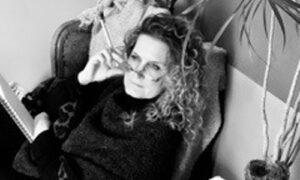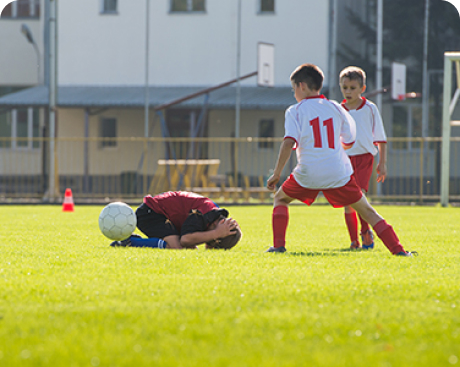Jillian Christine is the epitome of perseverance. A traumatic brain injury from a horrific car crash put her on a long road to recovery, with only the support of a few close loved ones. She was sent from doctor to doctor, ultimately left to find out by herself what worked and what did not. Since then, Jill has been a strong believer in patient advocacy and the importance of knowing your own health. Below, Jill shares her Inspiring Story to let others know they are not alone and show there is always hope.

Warning: This story contains mentions of suicide that may be triggering to some readers.
Jill Christine’s brain injury story is one 35 years in the making. It’s a story filled with ups and downs, one Jill has been hesitant to tell. Today, at age 53, she’s ready to share the wealth of information she’s picked up along the way to help others — especially women like her who may not receive the resources they need and struggle in silence.
Born at Marine Corps Base Camp Lejeune in Jacksonville, N.C., Jill was the only child in a military family that moved around frequently. Due to exposure to chemical contaminants at Camp Lejeune, she was born with several birth defects, including a clubbed foot and hip dysplasia.
A sports fanatic all her life, Jill competed in several different sports as a child. She started off playing soccer at age five, then got into gymnastics, skating, and competitive diving. Her father was a former football player, and the family loved following the University of Michigan football team.
Two days after her high school graduation in 1988, Jill was driving her Fiat Spider when she ran over a pothole, lost control of the car, and drifted into the next lane before being hit head-on by an oncoming van. She suffered a traumatic brain injury (TBI), as her head was split open at the top, among a series of other serious injuries. Jill had to rely on crutches for 10 months, and it was three full years before she had a full set of permanent teeth. She also struggled with amnesia, losing half of the memory from her first 18 years. Altogether, Jill underwent 35 surgeries during recovery.
“The worst part about the days, weeks, and months after was the feeling that life would never get better,” said Jill.
Eventually, Jill felt well enough to enroll at the University of Michigan for her studies. But because of her recurring issues with memory, she took half semesters off, and it took double the time to graduate.
After finishing school, Jill dabbled in a few industries, including construction, before pursuing a nursing degree, following in the footsteps of her grandmother, who was the head nurse at her hospital. Upon receiving her degree, Jill joined an intensive care unit where she took care of aging patients. A few years in healthcare, however, made her realize this career path wasn’t a great fit.
“I was so fed up with the dismissive nature of people in medicine who are supposed to act like professionals,” said Jill. “It reminded me of my experience as a TBI patient and at times not being taken seriously.”
After her accident, Jill has had her share of ups and downs, including bouts of depression and thoughts of suicide. The injury impacted her reproductive endocrinology, leading to infertility and miscarriages. A bone density exam showed signs of osteoporosis, and she also developed arrhythmia. Jill had married a man in the military, but he was abusive. Her father was largely absent. The only people in Jill’s life she felt she could count on were her mother, her grandfather, and a friend named KP.
From a young age, Jill’s mother taught her we are all responsible for our own happiness. There was no room for excuses in life – if you wanted something bad enough, you had to work harder for it. Find the root cause of a problem and have the drive to get the answers you need. Adapting to any situation was important, so was refusing to quit when the going got tough.
“My mother sacrificed so much for me and is the reason why I am still here,” said Jill. “She taught me humility, kindness, grit, fortitude, but most importantly, how to function in a world blind to the challenges I faced.”
Jill’s mother also emphasized the importance of service for others – not just to help them, but to heal the soul. Going through the trauma of her accident, Jill spent many moments trying to understand the purpose of her life and why she was still here. Though she didn’t know it at the time, Jill’s experience would end up being a gift. Three decades later, she has begun to harness of the power of her injury and use her perspective in the hopes of making substantive changes for the millions struggling from the devastating effects of traumatic brain injury (TBI).
KP came into Jill’s life later as an adult. Jill calls her a woman of deep faith, a guiding light, and a true blessing on Earth.
“She possessed the strong personality traits I was struggling to understand in myself, new traits that were born out of my head injury and drastically different from the meek and quiet girl I used to be,” said Jill.
KP and Jill’s mother were pivotal in Jill’s adjustment to life with a brain injury. Though they were opposites in personality, both were incredibly loving, fiercely loyal, extremely smart women who taught Jill strength, courage, and how to survive in a world which might not understand what she was going through.
“My mom encouraged all of the softer things in me, and KP told me to stand my ground unwaveringly,” said Jill. “Between the two of them, they taught me how to take on the world with grace and be able to withstand the storms that would undoubtedly arise.”
The effects of Jill’s brain injury last even to this day. In the beginning, she self-medicated with alcohol, trying to calm the countless thoughts swirling in her head. She couldn’t understand what was happening, why she was becoming so irritable, and why she could no longer pay attention. She recalls physicians showing little compassion, ignoring her symptoms and prescribing drugs with seemingly no rhyme or reason. It didn’t help that navigating health insurance was frustratingly complex — not to mention expensive — especially once she got divorced.
“I kept running into so many dead ends,” said Jill. “I simply got a slap on the back on my way out the door and as a result, my journey has really been off the beaten path.”
In her 30s, Jill began reading everything in sight to try and get better on her own. She figured out keeping herself isolated was extremely helpful in keeping her symptoms at bay. Medical marijuana also helped, and she was a big supporter of its legalization in Michigan, where she lives. Jill focuses on a holistic recovery approach and believes many complications from injury can be treated using natural methods instead of focusing too heavily on pharmaceuticals.
To that end, one of the hobbies Jill has incorporated into her daily life is gardening, which she says has been her salvation. She calls it the best form of therapy and says it brings many mental health benefits.
“There are so many parallels between gardening and living,” said Jill. “There is a need to constantly prune and tend to your life as you would a garden. There is power in spending time ruminating in your garden and much to be learned from the renewal of life occurring each year. It’s important to know when one season ends and when it is time to till soil for the next.”
Jill has become a strong believer in patient advocacy and standing up for yourself. She wants everyone to take charge of their own health, trying out treatments until finding one that works.
Similarly, Jill also hopes her story resonates with those in the military. Though she may not have served, she says there is a unique opportunity for the VA to explore how brain injuries can affect men and women differently. She hopes the VA specifically studies female veterans who may have been exposed to chemical contaminants at military installations and how those exposures can impact their brains and bodies.
“I want to shed light on all those who once were a part of the community, either through a spouse or parent, and then simply dropped later on without the help they desperately need,” said Jill. “It’s unfortunate people who need help the most are the ones left behind. Women present the science and medical communities with a unique opportunity to investigate what has transpired inside a body like mine over 35 years, following a TBI that has systematically impacted every body system.”
While searching for solutions online, Jill happened to read about the Concussion Legacy Foundation in a news article. Exploring CLF’s website, she was impressed with the data-driven research and science behind many of its resources and programs. Recently, Jill has participated in CLF Zoom Support Groups, which she has found extremely helpful and therapeutic.
“I am so happy I can share my experience with others like me, and listen to their stories as well,” said Jill. “This community has helped me realize I’m not alone.”
Jill has many reasons for sharing her story at this moment: anger at the medical professionals who mostly ignored her and others with TBIs; proof someone with a TBI can still live, survive, and thrive even three decades later; and the desire to use her talents to help others who did not have the same resources as her. Jill acknowledges the effects of her injury evolve every year, but she is still persevering in her journey.
Through everything, Jill’s mother continues to stay with her. Though she passed away in 2016 after battling breast cancer, Jill still hears her voice every day telling her to keep going and to never lose the will to fight.
“I’ll never give up, as long as I’m here.”
___________________________________________
Suicide is preventable and help is available. If you are concerned that someone in your life may be suicidal, the five #BeThe1To steps are simple actions anyone can take to help someone in crisis. If you are struggling to cope and would like some emotional support, call the Suicide and Crisis Lifeline at 988 to connect with a trained counselor. It’s free, confidential, and available to everyone in the United States. You do not have to be suicidal to call.
Are you or someone you know struggling with lingering concussion symptoms? We support patients and families through the CLF HelpLine, providing personalized help to those struggling with the outcomes of brain injury. Submit your request today and a dedicated member of the Concussion Legacy Foundation team will be happy to assist you.

